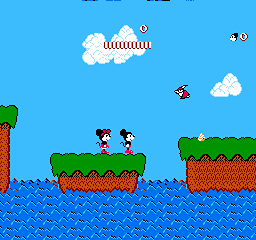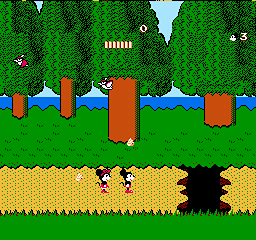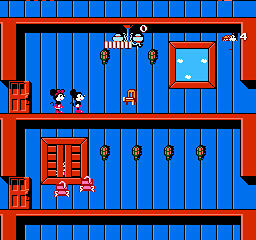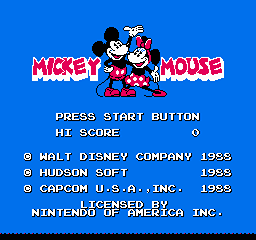
Mickey Mousecapade (1988-)
Developer: Hudson Soft
Publisher: Hudson Soft | Capcom
Genre: Platform
Mickey Mousecapade is a platform adventure game developed by Hudson Soft and published by Capcom for the Nintendo Entertainment System, released in Japan in 1987 and in North America in 1988. Known in Japan as Mickey Mouse: Fushigi no Kuni no Daibouken (translated as Mickey Mouse: Great Adventure in Wonderland), the game was loosely inspired by Alice in Wonderland, blending Disney’s characters with a surreal, storybook setting. While the North American version rebranded the game with a broader Disney theme, the core gameplay and structure remained the same. The title was not ported to other major systems, though it helped set the stage for later Disney games developed and published by Capcom during the late 1980s and early 1990s.
In Mickey Mousecapade, players guide Mickey Mouse through a series of colorful stages in search of Minnie’s missing friend, who is revealed to be Alice in the Japanese version. Minnie follows Mickey throughout the adventure, mimicking his movements, which adds both a layer of charm and challenge, as players must protect her from hazards while navigating obstacles and defeating enemies. Each stage has a distinct visual theme, including a funhouse, a pirate ship, and a haunted house, culminating in a showdown with classic Disney villains. The gameplay combines straightforward platforming with exploration, as players must locate hidden items and navigate maze-like levels to advance.
The soundtrack features upbeat, looping melodies that match each area’s setting, maintaining a bright and adventurous tone throughout the game. Hudson Soft’s compositions make strong use of the NES’s limited sound hardware, using rhythmic percussion and lively melodies to enhance the pace of each stage. Sound effects are sharp and responsive, emphasizing player movement, jumping, and projectile attacks. The music, while simple, captures the lighthearted and adventurous spirit of early Disney titles, reinforcing the game’s appeal to younger audiences and fans of classic animation.
Promoted under Capcom’s growing line of licensed Disney games, Mickey Mousecapade served as an early example of how Disney properties could be successfully adapted into engaging console experiences. The game received mixed reviews upon release; players praised its colorful visuals, recognizable characters, and catchy soundtrack, but some criticized its high difficulty and occasionally clumsy controls due to Minnie’s simultaneous movement. Despite these issues, it gained popularity among younger players and collectors for its charm and association with the Disney brand. While it did not receive a direct sequel, it paved the way for future Capcom-Disney collaborations such as DuckTales and The Magical Quest Starring Mickey Mouse, which refined the formula and built upon its early success.
Images from MobyGames
Buy Mickey Mousecapade
Click one of the Ebay or Amazon buttons below to check the latest prices and purchase Mickey Mousecapade for the Nintendo Entertainment System.

Related Searches
Mickey Mousecapade NES Download
Mickey Mousecapade is available to purchase and download from a range of vendors. Always shop around...
Mickey Mousecapade NES Manual
Various repositories around the internet have scanned and archived a range of retro manuals. Search now to.....
Mickey Mousecapade NES Rom
We don't host or link to rom sites for this game. However, there are many sites out there that may be...
Mickey Mousecapade NES Walkthrough
Many sites - particularly YouTube - host a range of walkthrough videos to guide you in your quest to get...
Mickey Mousecapade NES Cheats
There are various sites out there that can offer cheat codes for games. Search now to find all available...
Mickey Mousecapade NES Controls
This information can often be obtained through the user manual. Alternatively there are many sites out there...
Mickey Mousecapade NES Release Date
The initial release date for Mickey Mousecapade is stated as October 1988. Other ports of the game may..
Mickey Mousecapade NES Review
There are many sites out there that have collated and documented historic reviews of this game. Search now...
Mickey Mousecapade Famicom
As a Nintendo Entertainment System release, this game was also likely also available on the Famicom. This....
Mickey Mousecapade NES Speedrun
There is now a community of competitive speedrunners who will try and gain the fastest possible time on their....








